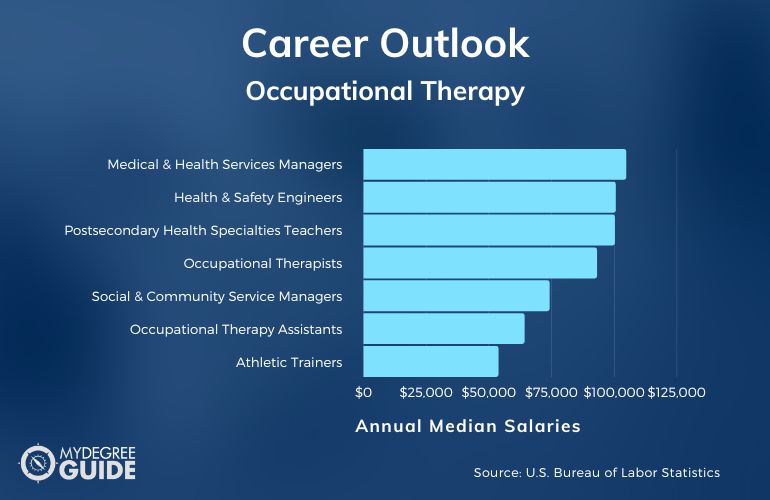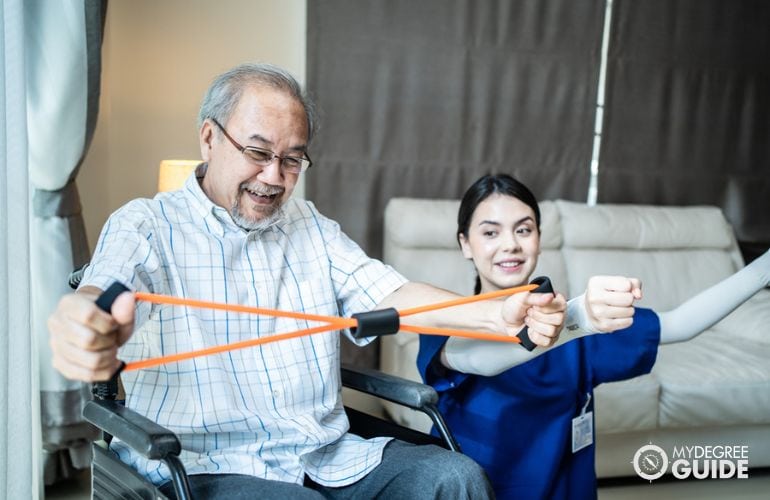Learning how to become an occupational therapist is the first step toward pursuing this growing and rewarding career in healthcare.

As an occupational therapist, you’d have opportunities to help many different people be successful in their everyday lives. The occupational therapy requirements include a good deal of schooling to prepare you for working in this field.
Editorial Listing ShortCode:
If you’re passionate about the idea of becoming an occupational therapist, then you may appreciate the thorough education that you’ll receive on the way to becoming a certified and licensed professional.
How to Become an Occupational Therapist

If working as an occupational therapist is your goal, then it’s helpful to know how to become an OT. It’s a multi-step process that takes several years to complete.
- Earn your bachelor’s degree from an accredited school. There’s not a specific occupational therapy major that you have to complete before grad school, but majors like kinesiology, biomedical science, and psychology are often recommended.
- Accumulate observation hours. You may be required to complete a set number of observation hours before you’ll be admitted to a graduate program in occupational therapy. It’s recommended to complete your hours in several different settings so that you can get a feel for what it’s like to work with various patient populations. You can often begin collecting these hours while still working on your bachelors degree.
- Decide what kind of degree you want to get. There are two main degree paths you can consider: a masters degree or a doctorate. The master’s-level program is usually a shorter and less expensive program that can lead to pretty much the same job opportunities as the doctoral one. With a doctorate, though, you’ll likely be able to do more in-depth study and, perhaps, spend time learning about a specialty area.
- Apply to and enroll in school. Once you’ve decided on your degree type, you may be ready to submit applications to colleges. After getting in, you can start your studies and work your way toward your graduate degree.
- Pass the certification exam. To work as an occupational therapist, it’s necessary to earn a passing score on the exam administered by the National Board for Certification in Occupational Therapy (NBCOT).
- Apply for licensure. Getting certified isn’t the same as being licensed to practice. It’s necessary to complete all of your state’s requirements, such as a degree and a passing NBCOT score, and then you can apply for a license from your state.
After getting licensed and finding a job, it’s beneficial to keep learning. Many states require regular recertification, which entails continuing education hours.
5 Things You Can Do as an OT
Studying how the human body moves and how people interact with their environments could lead to a variety of job opportunities. With knowledge of behavioral science and healthcare, you could consider any of the following roles.
1. Occupational Therapist

Working as an occupational therapist is, of course, a top goal for people who earn this degree and get certified. As an occupational therapist, you could help people live as independently as possible and engage with their environments.
Your clients might be schoolchildren, older adults, or people with disabilities. Common workplaces for occupational therapists include schools, skilled nursing facilities, hospitals, and private practice offices.
2. Occupational Therapy Instructor

With a graduate degree in occupational therapy, you might qualify to train OT professionals in certain settings. You’d have the opportunity to pass your knowledge on to others.
A master’s degree or a doctorate in this field might be sufficient for teaching community college classes that prepare students to work as occupational therapy assistants. To teach future occupational therapists, you’ll likely need at least a doctoral degree.
3. Ergonomist

Your understanding of how people move and function could make you a fitting candidate for working as an ergonomist, also known as a human factors engineer.
Most often, ergonomists tailor work environments to make them more suitable for comfort and productivity. Sometimes, ergonomists improve workplaces for all the people who operate in that space. Other times, they customize work areas to adapt them for a specific user.
4. Health and Exercise Coach

You could use your understanding of the body to help people get in shape. As a bonus, you’d probably find your background in psychology and behavioral science useful for tapping into people’s motivation.
As an athletic trainer or a health coach, you might encourage well-balanced eating as well as physical fitness. This job might include employment opportunities in gyms or health clinics. Self-employment and consulting could be options, too.
5. Recreational Therapist

Recreational therapists use various movements, games, and activities to improve their patients’ lives. Recreational therapy can be beneficial for both physical and mental health.
Hospitals, healthcare clinics, and community agencies may hire people to work as recreational therapists. It’s often necessary to pursue Certified Therapeutic Recreation Specialist (CTRS) status before applying for recreational therapy jobs. In some states, licensure is required as well.
Occupational Therapy Specialty Areas

Occupational therapists work in many different settings and with a variety of different client populations. You may want to focus your professional efforts on a particular area of this field. Common specialty areas include:
- Autism. Occupational therapy strategies can be particularly useful for supporting individuals with autism spectrum disorders, so you might want to pursue additional training to learn about working with this population.
- Gerontology. The specialty of gerontology focuses on working with older adults as their physical skills and cognitive abilities change with age.
- Mental Health. Helping people function more effectively in their environments could be useful in easing their symptoms of anxiety or other mental health disorders.
- Pediatrics. Occupational therapists who work with children in schools, hospitals, or clinics may use games and other engaging activities to help kids learn to perform everyday tasks.
- Physical Rehabilitation. People who are recovering from surgeries, accidents, or other situations that limit their physical mobility may appreciate the intervention of an OT to help them learn to reengage with the tasks of daily living.
As you gain experience in a particular branch of OT, you might want to consider becoming officially certified in that area through the American Occupational Therapy Association (AOTA) or another industry group.
Occupational Therapy Careers & Salaries

After studying occupational therapy, you might choose to work as an occupational therapist or pursue a related career path. According to the Bureau of Labor Statistics, the median annual salary for healthcare practitioners overall is $77,750.
| Careers | Annual Median Salaries |
| Medical and Health Services Managers | $104,830 |
| Health and Safety Engineers (Including Human Factors Engineers) | $100,660 |
| Postsecondary Health Specialties Teachers | $100,300 |
| Occupational Therapists | $93,180 |
| Social and Community Service Managers | $74,240 |
| Occupational Therapy Assistants | $64,250 |
| Athletic Trainers | $53,840 |
| Recreational Therapists | $51,330 |
| Rehabilitation Counselors | $39,990 |
| Occupational Therapy Aides | $37,060 |
Some of the jobs on this list may require you to complete additional training, such as a certificate, a graduate degree, or a post-professional degree.
Occupational Therapy Programs Accreditation

Throughout your occupational therapist schooling, it’s essential to earn your education from regionally accredited colleges. Certification and licensure are required in this field, and attending regionally accredited institutions is usually a prerequisite for applying for those credentials.
Even if you don’t intend to pursue professional OT certification, accreditation is still beneficial. Without it, you may be denied the opportunity to use federal financial aid, transfer classes between schools, or apply to advanced training programs.
ACOTE Accreditation
It’s also necessary to attend a graduate OT program that is accredited by the Accreditation Council for Occupational Therapy Education (ACOTE). This industry organization validates whether colleges’ OT programs meet industry standards.
To qualify to take the NBCOT exam, an essential step in becoming an occupational therapist, you’re required to have completed an ACOTE accredited program. Unless you pass the NBCOT test, you won’t be able to use the Occupational Therapist Registered (OTR) title.
Is Financial Aid Available?

There may be financial support available for qualifying students pursuing occupational therapy schooling. Government assistance may come to you as loans or grants. You may be more likely to get grants during your undergrad years than for your graduate program, but loans are often available for students at all levels.
You can check out your state’s student aid programs as well as federal ones. Additional tuition help may be available in the form of institutional scholarships, other scholarships, fellowships, and employer assistance. As you look into funding your tuition, it’s beneficial to fill out the Free Application for Federal Student Aid (FAFSA).
Is Occupational Therapy a Good Career Path?

Yes, occupational therapy is a good career path for many professionals. There’s a lot of variety available to people who work in this field.
Whether you want to work with kids, senior citizens, or people recovering from accidents, there could be a place for you in occupational therapy. Plus, you may be able to shape your work life in a way that suits you. Both part-time and full-time roles are available.
Some people choose self-employment or work as consultants instead of in direct practice. Data from the Bureau of Labor Statistics shows that occupational therapists commonly earn annual salaries between $63,320 and $123,870.
What Is an Occupational Therapist?

An occupational therapist (OT) is a healthcare professional who supports clients with physical limitations or other challenges.
Occupational therapists help people engage with the world around them, increase their mobility, and complete daily tasks. Going through occupational therapy could help people gain more independence, recover from an accident, or learn mental health coping strategies.
Occupational therapy is a regulated profession. Someone who uses the Occupational Therapist Registered (OTR) title has completed an OT education at the graduate level and passed a certification exam. An OTR should hold state licensure as well.
Should I Become an Occupational Therapist?

You might be a fitting candidate for a job in occupational therapy if you want to experience a lot of variety in your career. Each client has different needs, so you’ll continually be faced with new challenges.
Not everything an OT does involves working directly with clients, though. These professionals also take detailed notes about therapy sessions and fill out a lot of paperwork. An occupational therapist can benefit from skills that include dedication, clear communication, and scientific thinking. It’s also beneficial to be someone who works well with people, including clients and other care providers.
What Does an Occupational Therapist Do?

Occupational therapists assess clients’ needs and develop strategies that will make a difference in their daily lives. OTs often work with kids, senior citizens, and people who are recovering from injuries.
They encourage clients to perform exercises to increase their range of motion or their dexterity. Occupational therapists also suggest various adaptations that can make tasks easier. That can include mobility equipment or modifications to the home or workplace.
OTs often collaborate with other members of a patient’s healthcare team. They also keep detailed and accurate records of their clients’ progress.
Where Do Occupational Therapists Work?

Occupational therapy is a career that offers a lot of variety, including a range of potential work settings. According to the Bureau of Labor Statistics, around 30% of occupational therapists are employed by hospitals.
Other top employment sites for OTs include private healthcare offices and schools. Occupational therapists can also work for home healthcare agencies and skilled nursing facilities. While occupational therapists typically have a home base, such as an office, they might also go out in the field with clients to learn about their daily activities.
How Much Does an Occupational Therapist Make?

According to the Bureau of Labor Statistics, the majority of occupational therapists make between $63,320 and $123,870 each year. Salary varies based on experience, workplace, and other factors. For instance, home healthcare organizations often pay the highest wages. The median salary for jobs in that setting is $101,500.
The next highest category, jobs in skilled nursing facilities, offers a median salary of $99,550. Elementary and secondary schools may have the lowest pay rates for OTs. The median salary for school OTs is $79,660, which is still well above the average pay for all occupations.
Is Occupational Therapy Hard?

In an occupational therapy degree program, you’ll study a variety of different subjects. Occupational therapists need to know about the human body and how it moves. So, anatomy, physiology, and kinesiology courses are important.
There’s a behavioral science component to this field, too. Classes in psychology and related areas can help you learn to connect with clients, support their mental health challenges, and tap into their motivation. In both the classroom and the field, you’ll learn occupational therapy techniques. You can expect to spend time earning observation and experience hours in OT settings.
What Degree Do You Need to Be an Occupational Therapist?

You’re required to hold a graduate degree to work as an occupational therapist, but you have options for which degree to get. One option is an occupational therapy master’s degree. This may be called a Master of Science in Occupational Therapy (MSOT) or a Master of Occupational Therapy (MOT).
Another occupational therapist degree to consider is the Doctor of Occupational Therapy (OTD). It’s a longer program than the master’s degree but often involves more in-depth study. These degrees can lead to similar job opportunities and salaries. A growing number of universities offer an occupational therapy doctorate online.
What Skills Do You Learn in Occupational Therapy?

In an OT program, you can learn to assess patients and record your findings. You will also learn how to build treatment plans that address your clients’ needs.
Safety is an important skill for occupational therapists to know. You’ll learn to understand how exercises can be performed safely and how to communicate that to your clients. In fact, communication in general is a key skill to develop. Not only do OTs regularly communicate with their clients, but they also talk to clients’ families and their other healthcare providers.
How Long Does It Take to Become an Occupational Therapist?

It’s common to spend 6 to 8 years completing occupational therapist schooling. Earning a bachelor’s degree generally takes around 4 years with full-time enrollment. Some students are able to get through their undergrad studies a little more quickly by enrolling in fast-track online programs.
After that, the next step is to earn a graduate degree. Master’s degree programs might take around 2 years to finish with full-time study. A doctorate could take 3 or more years. You might also want to spend extra time after graduation studying for the exam. Your state may have licensing regulations for you to fulfill as well.
What’s the Difference Between an OT vs. OTA?
There are several types of professionals who work in the occupational therapy field. In particular, many OT settings involve both occupational therapists and occupational therapy assistants.
| Occupational Therapist (OT) | Occupational Therapy Assistant (OTA) |
|
|
The above salary data is from the Bureau of Labor Statistics. The National Board for Certification of Occupational Therapy (NBCOT) oversees certification for both OTRs and OTAs.
What’s the Difference Between a Physical Therapist vs. Occupational Therapist?
Students who want to work with people who are recovering from injuries or surgeries may consider becoming physical therapists or occupational therapists.
| Physical Therapist (PT) | Occupational Therapist (OT) |
|
|
PTs and OTs often work in similar settings, such as hospitals and healthcare clinics, and they often collaborate.
Is Becoming an Occupational Therapist Worth It?

Yes, becoming an occupational therapist is worth it for many students. Occupational therapy is a field in which you can directly affect people’s lives. You may help clients live more independently or gain increased confidence in their ability to interact with the world. Also, there is a growing need for occupational therapy professionals.
The Bureau of Labor Statistics expects the demand for occupational therapists to increase by 14% over the next ten years, which is much faster than average. Those who specialize in autism or gerontology may be especially employable.
Getting Your OT Degree Online

Occupational therapy professionals can help clients gain independence, mobility, or confidence. It can be fulfilling to know that you’re making a difference for other people. It can take several years to become an OT, but many find the effort worthwhile.
Now that you know how to be an occupational therapist, it’s time to take the next step toward your career in this field. You can start by searching for the degree programs that will help get you there. You can even complete online studies in OT from accredited universities.
Why not check out the options that are available to you today?
